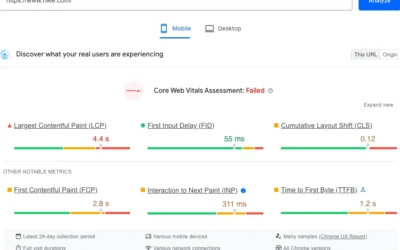Technical SEO Audit Consultant

Why are SEO Audits Important?
Search engine optimization (SEO) audits are important because they help you determine whether your website is optimally designed to attract search engine traffic. SEO audits examine your website’s code, structure, content, design, and other factors to identify opportunities and areas for improvement. By conducting an SEO audit, you can make sure that your website is designed in a way that will make it more visible and attractive to search engines, which can ultimately lead to more traffic and better search engine rankings.
The SEO audits provided by Shane Hampson are likely not like any website audit you have seen before. These audits are over 50 pages and 10,000 words long on average. Over 50 different elements are audited to provide the technical SEO roadmap your website needs to succeed online.
Related: Free SEO Training Resources
Areas of Emphasis for SEO Audits?
The technical SEO audit analyzes your website against the three pillars of SEO:
On-site Technical Health
The technical health of your website. A few examples:
- Does your website have indexation issues?
- Healthy status codes?
- Is your robots.txt and XML sitemap in place and are they optimized?
- Is your website passing core web vitals?
- Have you been penalized for intrusive interstitials?
Off-site
Think about all things not living on your website that impact your SEO.
- What does your backlink profile look like?
- Are you acquiring inbound links at an “organic” velocity?
- What type of neighborhoods is your website associated with?
- Do we need a link disavow?
- If you are a local business what does your Google Business Profile look like?
- Are your citations (NAP+w) current and correct?
Content
When you think of content in an SEO audit think about E-E-A-T (Experience, Expertise, Authoritativeness and Trustworthiness) which is what Google Quality Rating Guidelines use to determine how valuable your content is.
- Does your content answer the search intent of the query?
- Is your content fresh?
- How is the keyword density?
- Do you have similar pages that could be cannibalizing your top core pages?
- Does your content make you a topical authority?
- Has Google penalized you for unhelpful content?
Ready to take your SEO to the next level?
Now that you’re on a mission to make your website friendly to the search engines, it’s time to plan your next move. Feel free to book a strategy session, and we can discuss your plan of action.
What does the SEO Audit Include?
You can expect the SEO audit to be delivered in two separate attachments – one PDF and one spreadsheet. The PDF will provide a detailed summary of each of the 50+ elements being audited. Each section will contain a textual summary of what the element is and why it’s important. If the element fails, a visual (screenshot) will be included as an example. The SEO audit will also notate how many and which specific URLs are impacted by this failed element.
The spreadsheet will mirror the PDF and will contain each specific instance of elements that need to be further optimized. The spreadsheet will have a cover page summary and dozens of tabs with the exact issues, the URLs impacted and the recommendation.
Related: Free SEO Glossary
Here are some of things included in the technical SEO audit (this is not a comprehensive list)
- Indexing and Crawlability: Check for indexing issues to ensure search engines can properly crawl and index the website.
- User Experience: Evaluate the website’s user experience to ensure it is intuitive and easy to navigate.
- Site Architecture: Assess the website’s structure and organization to ensure it is logical and user-friendly.
- Competitor Benchmarking: Compare the website’s performance with that of its competitors to identify areas for improvement.
- Keyword Research: Conduct thorough keyword research to identify relevant and high-performing keywords for the website’s content.
- On-Page SEO: Review on-page elements such as meta titles, meta descriptions, and body copy for optimization.
- Backlink Profile: Analyze the website’s backlink profile to identify both valuable and problematic links.
- Mobile-Friendliness: Ensure that the website is optimized for mobile devices, considering the increasing number of mobile searches.
- Technical SEO Factors: Check for technical issues such as problems with robots.txt, sitemaps, and image optimization.
- Page-Level Factors: Evaluate factors such as E-A-T (Expertise, Authoritativeness, Trustworthiness), headlines, and user engagement on individual pages.
- Content Length and Quality: Assess the length and quality of the website’s content, including image links and content organization.
- Duplicate Content Issues: Identify and address any duplicate content issues on the website.
- Website Updates: Monitor ongoing website changes and identify any major issues that may arise during the process.
- Schema Markup: Check for the presence and proper implementation of schema markup on the website.
- Organic Click-Through Rate (CTR): Analyze the website’s CTR in organic search results and identify opportunities for improvement.
- Google Search Console (GSC): Use GSC to monitor and troubleshoot issues related to the website’s presence on Google.
- Google Analytics: Leverage Google Analytics to measure the impact of SEO actions and prioritize action items based on traffic da.
- Page Speed: Assess the website’s page speed using tools like Google’s PageSpeed Insights and GTMetrix.
- Content Accuracy and Recency: Identify opportunities to improve the accuracy and recency of the website’s content.
- Featured Snippet Optimization: Look for opportunities to optimize content for featured snippets and other rich search results features.
- Passage Ranking Optimization: Identify opportunities to optimize content for passage ranking in search results.
- Local SEO: Evaluate the website’s performance in local search results and optimize for local search intent if applicable.
- Structured Data: Check for the correct implementation of structured data to enhance the website’s appearance in search results.
- Internal Linking: Assess the website’s internal linking structure to ensure it facilitates easy navigation and distributes link equity effectively.
- 404 Errors and Redirects: Identify and address any 404 errors and implement proper redirects where necessary.
- Canonicalization: Ensure proper canonical tags are in place to avoid duplicate content issues.
- HTTPS and Security: Verify that the website is secure with HTTPS and address any security-related issues.
- XML Sitemap: Check for the presence and accuracy of the XML sitemap to aid search engines in crawling the website.
- Robots.txt: Review the robots.txt file to control search engine crawlers’ access to specific parts of the website.
- Image Optimization: Optimize images for size, alt text, and relevance to improve page load times and accessibility.
- Social Media Integration: Evaluate the integration of social media elements and sharing options on the website.
- Structured Data Markup: Implement structured data markup to enhance the appearance of the website in search results.
- Accessibility: Ensure the website is accessible to users with disabilities and complies with accessibility standards.
- Content Freshness: Assess the freshness of the website’s content and identify opportunities for updating and refreshing.
- Video and Multimedia Optimization: Optimize video and multimedia content for search engines and user experience.
- Local Business Information: Verify the accuracy and consistency of local business information across the website and external sources.
- International SEO: If applicable, assess the website’s performance in international search results and optimize for multilingual and multinational SEO.
- Voice Search Optimization: Consider optimizing content for voice search queries and natural language processing.
- Site Speed and Performance: Evaluate overall site speed and performance, including server response times and resource loading.
- Conversion Rate Optimization (CRO): Identify opportunities to improve conversion rates through website design and user experience.
- Content Audit: Conduct a comprehensive content audit to assess the quality, relevance, and performance of existing content.
- Blog and News Section Optimization: Optimize blog and news sections for visibility and engagement in search results.
- E-commerce SEO: If applicable, assess the website’s performance in e-commerce search results and optimize product pages and categories.
- User-Generated Content: Review user-generated content for quality, relevance, and potential SEO impact.
- Brand Reputation and Online Presence: Monitor and manage the website’s brand reputation and online presence across various platforms.
- Customer Reviews and Testimonials: Evaluate the visibility and impact of customer reviews and testimonials on the website.
- Site Search Functionality: Assess the effectiveness and relevance of the website’s internal search functionality.
- Legal and Compliance: Ensure the website complies with legal requirements, privacy policies, and data protection regulations.
- Performance Monitoring and Reporting: Establish a system for ongoing performance monitoring and reporting to track the impact of SEO efforts and identify further optimization opportunities.
These elements collectively contribute to a comprehensive website audit, covering technical, content, and user experience aspects to ensure the website is optimized for search engines and user engagement.
Frequently Asked Questions
Are SEO Audit tools like SEMRush good at Technical Audits?
Tools like SEMRush site auditor certainly have their place, in fact, while in a pinch I have use the SEMrush site auditor or comparable tools many times in my career. However, there are impactful limitations with those tools. For example, tools like SEMRush, Deep Crawl, Botify and even Screaming Frog all point out helpful information such as orphaned pages, title tags that are missing, duplicate or the incorrect length but those are very foundational things.
Truly impactful SEO happens beyond the foundational elements and dives deep on your whole website including whether your current CMS is SEO friendly or if a different recommendation might be needed.
Let’s assume both your website and your competitors have all of the basic elements covered on each URL.
Each of the following is the correct length and unique:
- Meta Data
- Heading Tags
- Image Alt Text
- Canonical URLs are in place
- XML Sitemap is submitted
- Robots.txt
- Hreflang
You run a SEMRush (or something similar) site audit and it shows everything is in place and you score 100% on your site health. Does that mean your website has good SEO? No. Not necessarily. An experienced SEO consultant can analyze these elements beyond the foundational level a non-human tool can do.
Example, let’s focus on meta data (title tags and meta descriptions).
The automated site auditor tool shows you are passing because each URL has a unique title tag and meta description and they are within the “ideal” length. However, Google and other search engines are going to grade these elements on other factors too such as relevance to the content on the page. Does the title tag and meta description provide a great preview of what the searcher is going to see on the URL they click on or was the meta data created because the keywords you put in the meta data had more monthly searches? Examples like this are things that automated SEO tools just can’t account for but these are the elements that can play a major part in the organic search results.
How long does an SEO audit take?
The SEO audits I provide generally take about 5-7 business days to complete but it also depends on how many pages you have. E-commerce websites with thousands of pages could take longer while a simple website with only 25 pages could be done quicker.
Ready to take your SEO to the next level?
Now that you’re on a mission to make your website friendly to the search engines, it’s time to plan your next move. Feel free to book a strategy session, and we can discuss your plan of action.
Recent Blog Posts
Can you use interstitials for SEO?
What are interstitials and are they good for SEO? Should you avoid intrusive interstitials? What does Google say?
Using PreLoad, PreConnect and Prefetch for SEO
Learn how to use pre-load, pre-connect and pre-fetch to boost your SEO site speed and Core Web Vitals.
How To Optimize For Core Web Vitals
Core Web Vitals are a set of specific factors that measure loading performance, interactivity, and visual stability of a web page, and they are crucial for providing a good user experience and improving SEO.



